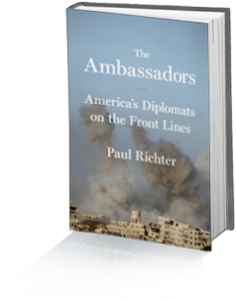 The Ambassadors is the story of the small circle of top career diplomats who led American missions in the greater Middle East through war and revolution in the years after the 9/11 attacks.
The Ambassadors is the story of the small circle of top career diplomats who led American missions in the greater Middle East through war and revolution in the years after the 9/11 attacks.
Presidents and secretaries of state turned repeatedly to seasoned Middle East hands to serve as their chief troubleshooters and primary links to countries on the edge, from Iraq and Afghanistan to Libya, Pakistan and Egypt.
Diplomats are usually imagined as placid palace-dwellers in striped pants. These ambassadors were called on to be statesmen, warriors and nation-builders. Their foreign service peers admired them as the best people for the worst places. Though they were unknown to most Americans, they served as a crucial line of national defense.
The book paints vivid portraits of four of them. Ryan C. Crocker, a six-time ambassador, was dispatched to Afghanistan after the 9/11 attacks to help organize a new government. Over the next decade, two presidents sent him back to Iraq and Afghanistan as ambassador to find a path between warring factions that would allow U.S. armies to come home. Anne W. Patterson, a veteran of Latin American drug wars, was sent to Pakistan when American officials considered it the most dangerous country in the world. She brokered deals that kept fragile governments from collapsing to political crisis or military coup. Robert S. Ford served more time in Iraq than any other foreign service officer, then, as ambassador to Syria, stood up to a dictator who was slaughtering his own people. J. Christopher Stevens,a diplomat with a gift for making friends, became the most well-known expeditionary diplomat when he was killed during a terrorist attack in Benghazi, Libya, in 2012. Washington politicians fought over who was to blame for his death, but diplomatic veterans saw Stevens as proof that the job cannot be done right without risk.
The diplomats were part of a proud tradition of Mideast specialists in the State Department. In recent decades the Near Eastern Affairs Bureau had more than its share of the department’s most important work. Insiders considered it an elite club that admitted only the best.
The Ambassadors goes behind the curtain to explain how American diplomats deal with states in war and civil crisis. It often looks little like what is disclosed in official pronouncements.
- As chief of the U.S. embassy in Kabul in early 2002, Ryan Crocker was tasked to make sure that a column of Afghan allies’ tanks could cross the country to join the largest battle of the war. To get the job done, he had to threaten the life of an Afghan warlord—an ally.
- One of Crocker’s most important collaborators in the period was Qassim Suleimani, the Iran military mastermind who is generally seen as an American archenemy. Through intermediaries, Crocker and Suleimani negotiated the composition and management of a new government in Afghanistan in 2001 and 2002. In 2003, the two secretly bargained over the membership of the first Iraqi governing body put in place after the U.S. invasion.
- As one-man government of Iraq’s Najaf province in 2003, Robert Ford carried on a running argument with his superiors over how the occupation government should deal with the firebrand militia leader Moqtada Sadr. Sadr was trying to set up a separate Islamist government and assassinate Iraqi and U.S. officials, including Ford. When Ford pressed the occupation government to arrest Sadr, officials in Baghdad and Washington resisted. Years later, after Sadr’s fighters had killed hundreds of U.S. troops, former occupation chief J. Paul Bremer III acknowledged Ford had been right.
- In public, many Pakistani politicians built their careers on defiance of America. In private, even pro-Taliban leaders sought American approval for their political careers and causes. They assumed the American ambassador, like a British imperial viceroy, could get anything done in their country. When political crisis threatened to bring on a military coup in 2009, the army and politicians of varying stripes all turned to Anne Patterson to broker a deal.
- Some of the ambassadors’ toughest battles were not with the jihadists but with their local partners. Hamid Karzai, the longtime Afghan president, used erratic behavior to keep American generals and diplomats like Crocker off balance. He held cordial meetings with Americans then minutes later issued official statements denouncing them as war criminals.
In the years after these ambassadors ended their service, the foreign service saw its numbers shrink and its influence decline. But their stories attest to its contributions.